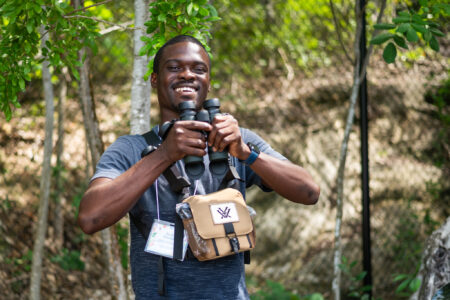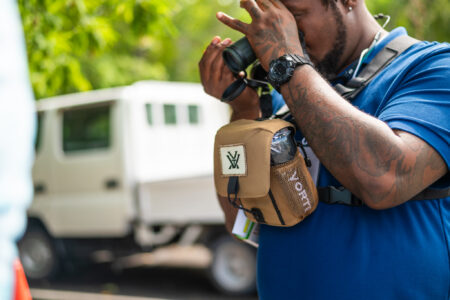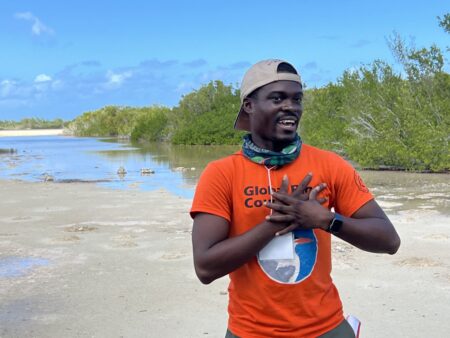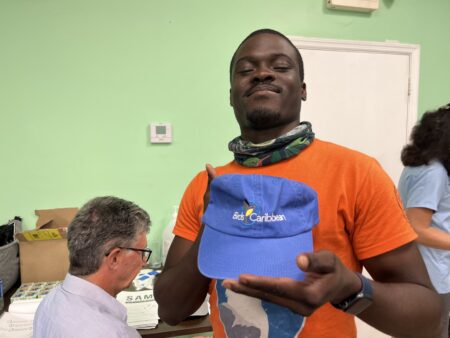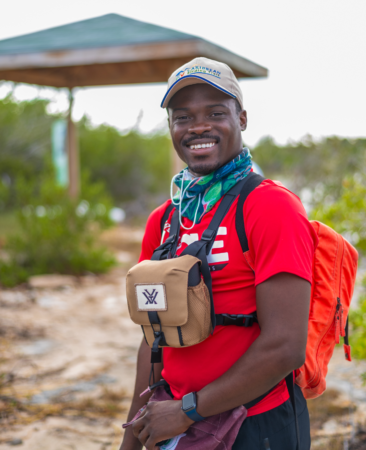 For Turks and Caicos Islands Environmental Officer, Dodly Proper, our Caribbean Birding Trail (CBT) Bird Guide Training Workshop was “a mini-quest of self-discovery and the ‘human connection’.” Having worked with the TCI government across the realms of ecology and education, Dodly was uniquely positioned to apply the knowledge and skills taught in this workshop. Like other participants he was put through the wringer of bird identification in the classroom and in the field. And indeed, practice made perfect! But it was the lessons on interpretation* and sharing of real-life guiding experiences by two of the facilitators, Rick and Beny, that created the environment for exploring the nuances of interpersonal connection and building meaningful relationships with clients. Read on for Dodly’s lively and pop-culture reference laden account of his CBT experience!
For Turks and Caicos Islands Environmental Officer, Dodly Proper, our Caribbean Birding Trail (CBT) Bird Guide Training Workshop was “a mini-quest of self-discovery and the ‘human connection’.” Having worked with the TCI government across the realms of ecology and education, Dodly was uniquely positioned to apply the knowledge and skills taught in this workshop. Like other participants he was put through the wringer of bird identification in the classroom and in the field. And indeed, practice made perfect! But it was the lessons on interpretation* and sharing of real-life guiding experiences by two of the facilitators, Rick and Beny, that created the environment for exploring the nuances of interpersonal connection and building meaningful relationships with clients. Read on for Dodly’s lively and pop-culture reference laden account of his CBT experience!
I wasn’t sure what to expect when I walked through those doors. The topic was birds; it was the Caribbean Birding Trail workshop, after all. But as I sat and waited, the room began to fill with new and familiar faces, and lectures on bird identification began. I thought to myself: “I – I know this, I’m a birder”— and honestly, I did. I wasn’t a stranger to the birds of the Turks and Caicos Islands. This was apparent when we had our field practice exercise, virtual birding quiz and morning and evening birding trips, where colleague Della Higgs would occasionally say, “Dodly, you don’t get to answer; you know it already.” I wasn’t the only one being told that, as there were a couple of skilled individuals in our midst.
Although I am a birder, the binoculars lesson revealed something to me. Practice makes perfect, but good practice makes good results, and I wasn’t too good at using binoculars. I would like to blame all cameras for having a viewfinder that can only accommodate one eye. It was a game-changing revelation, especially when there were multiple birding events throughout the week.
Putting binoculars aside – how do we build a bird guiding business?
As we made it to the last half of the workshop, CBT Project Manager, Holly Robertson introduced us to the Caribbean Birding Trail Framework, and if I had any doubts about the initial stage of becoming a guide, they were beginning to fade. It was reassuring to know I was not alone, and even more so when we were given life-tested advice on how to gain credibility and market ourselves. With regards to the business realm of birding, and learning how to be an interpretive guide, trainers Beny Wilson and Rick Morales’ lessons and the expectations I had of this workshop over those few days were met — but also transformed into something personal. I expected to learn about the “ins and outs” of becoming a guide; but then it became a mini-quest of self-discovery and the ‘human connection.’
I won’t say that I delved deep into the “inner enigmatic machinations of my being.” However, I did learn about Maslow’s hierarchy of needs and how it relates to the guests’ experiences, as well as the principles of interpretation*, a form of mission-based communication that helps humans understand the natural world through story telling with a message that can help them form a positive, sustainable relationship with the environment. It was one thing to hear the reasoning, but another to hear Beny’s and Rick’s stories. All the attendees were completely silent as we listened to Rick’s membraphonic jaguar-caller [an instrument that uses vibrations to mimic the vocalizations of jaguars], and the journey that led him to it. There was bewilderment, turning into “N’awws,” after hearing Beny’s Blind birder.
Overcoming nerves, finding the rhythm
After hearing their tales, it was our turn, on the final day of the workshop, to give an interpretive talk with a message using our journeys and stories. I spent the better part of the night thinking that I could write a story, but public speaking is a bit of an ordeal for me. I eventually had to jump off the four-foot ledge I was hanging from and presented an interpretive rendition of “We all have rhythm, if we listen hard enough,” to a group of ever-familiar strangers. A smidgin of presenter’s anxiety started to take its hold on me [heart racing, weak knees, palms sweaty and hoping I’ll say everything right].
I know I wasn’t the only one who felt that way, and that was reassuring. But it was also both comforting and connecting. That day, we all had the same task and goal. We wanted each other to feel our message, and that we did. I don’t cry as much as a person should, and I’m sure that’s a personal problem I have to work on, but it was somewhat difficult not to be emotional on that day. Throughout that week, I don’t think we laughed and cried harder on any day than on the last.
I learnt many things about myself, guiding, and birding and made friends I would have never encountered otherwise. If I had a time machine…10 out of 10, I would do it again.
Dodly Prosper works as Environmental Officer: Terrestrial Ecologist in the Department of Environment and Coastal Resources (DECR) in the Turks and Caicos Islands Government. He has worked with DECR in various contract positions since 2019, and has also served with the Ministry of Health and as a lecturer for the Turks and Caicos Islands Community College. Mr Prosper has worked as an ecological consultant on numerous environmental projects. He completed his undergraduate diploma at University of York in 2018 and is looking forward to completing a Master’s diploma. Mr Prosper focuses on entomology and ornithology but is also venturing into botany and marine biology. His interests outside of work include painting in watercolors and oils, photography, and Pokémon games. He catalogs his environmental investigation on his blog, The Trying Ecologist.
Acknowledgements: The CBT Interpretive Guide Training was made possible through the generous support of our sponsors and local partners. These include the Sandals Foundation, the Turks and Caicos National Trust, Darwin Plus Initiative, the Turks and Caicos Department of Environment and Coastal Resources, the Royal Society for the Protection of Birds, Marshall Reynolds Foundation, Shika Shika, US Forest Service International Programs, and Vortex Optics.
The TCI CBT Interpretive Guide training is the seventh training to be carried out by BirdsCaribbean. Previous trainings have been held in Grenada, Jamaica, Dominican Republic, Bonaire, Cuba, and St. Vincent and the Grenadines. These guide trainings are integral to advancing the vision of the CBT—connecting people to the extraordinary places, diverse cultures, and people of each island. Through the CBT, we promote natural and authentic experiences that benefit local people and encourage the protection of the Caribbean’s natural resources, including birds and their habitats.
*Interpretation is a purposeful approach to communication that facilitates meaningful, relevant, and inclusive experiences that deepen understanding, broaden perspectives, and inspire engagement with the world around us. (National Association of Interpretation).
DOWNLOAD A FREE CHECKLIST OF THE BIRDS OF TURKS AND CAICOS ISLANDS AND PLAN A BIRDING TRIP TODAY!

